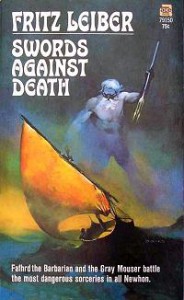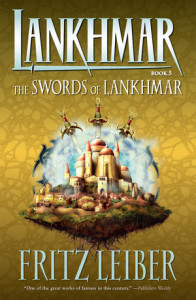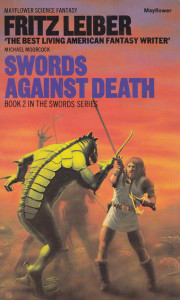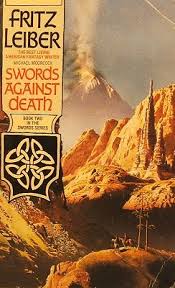Swords Against Death Re-Read: “The Bleak Shore”
 Bill Ward and I are re-reading a book from Fritz Leiber’s famous Lankhmar series, Swords Against Death. We hope you’ll pick up a copy and join us. This week we tackled the fourth tale in the volume, “The Bleak Shore.”
Bill Ward and I are re-reading a book from Fritz Leiber’s famous Lankhmar series, Swords Against Death. We hope you’ll pick up a copy and join us. This week we tackled the fourth tale in the volume, “The Bleak Shore.”
 Howard: “The Bleak Shore” felt a little like a story written on deadline. That’s not to say that there aren’t any masterful moments. In lesser hands the emergence of the things from the eggs would have seemed a lot less tense and perhaps even ridiculous, whereas Leiber pulled off horror. Then there are wondrous visual descriptions of the sea travel and of the behavior of the characters under the curse.
Howard: “The Bleak Shore” felt a little like a story written on deadline. That’s not to say that there aren’t any masterful moments. In lesser hands the emergence of the things from the eggs would have seemed a lot less tense and perhaps even ridiculous, whereas Leiber pulled off horror. Then there are wondrous visual descriptions of the sea travel and of the behavior of the characters under the curse.
Bill: I can’t disagree. I think the climax may have been a bit hastily written as well. One interesting thing about the story is the switch to the last surviving Mingol crewman for the narration of the “geased” voyage, and then a switch back to our heroes in media res on the Bleak Shore far from civilization. A great way to both economize and build tension, and also to create that great sort of ‘doomed expedition’ weird tale vibe.
 Howard: A good point. I thought Ourph’s narration of the ill-fated sea voyage really evocative — my only problem with it was that I signed on for the adventures of Fafhrd and Mouser, not the sea voyage of Ourph the Mingol. But that’s a minor quibble. More troubling — it wasn’t entirely clear to me what the Mouser had done at the very end. Is that the sorcerer he’s killed, and the guy they saw in the tavern was a simulacrum? Or is this some kind of entity linked to the sorcerer? And then I have to say I was disappointed that I saw so little of the banter and camaraderie that I’d enjoyed so much in the last two stories. During most of this one Fafhrd and the Mouser are cursed and driven. And while Leiber did a great job showing us what that was like, I missed them as usual.
Howard: A good point. I thought Ourph’s narration of the ill-fated sea voyage really evocative — my only problem with it was that I signed on for the adventures of Fafhrd and Mouser, not the sea voyage of Ourph the Mingol. But that’s a minor quibble. More troubling — it wasn’t entirely clear to me what the Mouser had done at the very end. Is that the sorcerer he’s killed, and the guy they saw in the tavern was a simulacrum? Or is this some kind of entity linked to the sorcerer? And then I have to say I was disappointed that I saw so little of the banter and camaraderie that I’d enjoyed so much in the last two stories. During most of this one Fafhrd and the Mouser are cursed and driven. And while Leiber did a great job showing us what that was like, I missed them as usual.
Perhaps I should be pleased that he managed variety so that a Fafhrd and Mouser tale isn’t just the same thing every time… but there really aren’t THAT many of these written at the height of his powers, so I still felt a little let down.
Bill: There is one line about the wizard “sending the spirit of himself out into the world,” or something. My guess is that the embryonic wizard grows in the egg until some adventurers arrive to meet their death (and provide him with energy?), then he hatches and goes out into the world to send more adventurers back to the bleak shore, where the process would repeat.
 Howard: Yeah, you may be right. That feels a lot weaker than what we saw last week, as though it were made up on the fly. I don’t think this was a bad one (certainly I’ve re-read it more than once, which is more than I can say for the tales in Swords and Ice Magic). It entertained me, and there were moments of excellence, but it’s certainly not one that will make my best-of list.
Howard: Yeah, you may be right. That feels a lot weaker than what we saw last week, as though it were made up on the fly. I don’t think this was a bad one (certainly I’ve re-read it more than once, which is more than I can say for the tales in Swords and Ice Magic). It entertained me, and there were moments of excellence, but it’s certainly not one that will make my best-of list.
Bill: Agreed. There’s not a whole lot to add to this one. It was a short, fun story with some great invention and the always wonderful writing of Leiber, but not a standout.
Howard: That’s it, then. Next week we’ll move onto one I remember being a lot stronger, “The Howling Tower.”
6 Comments